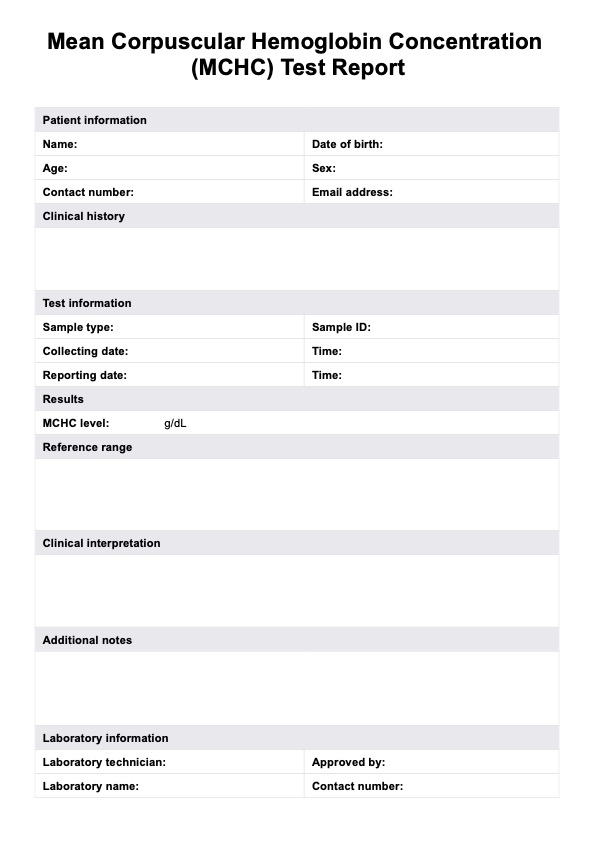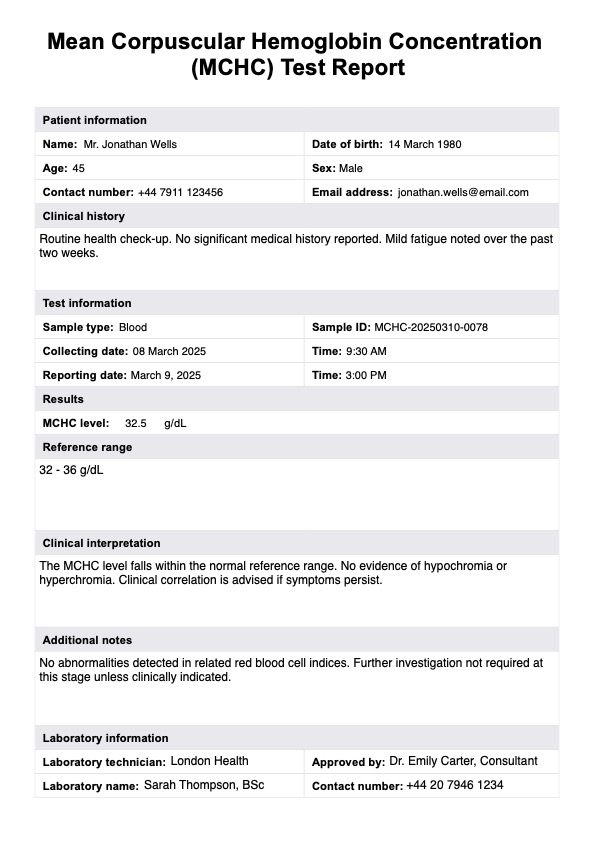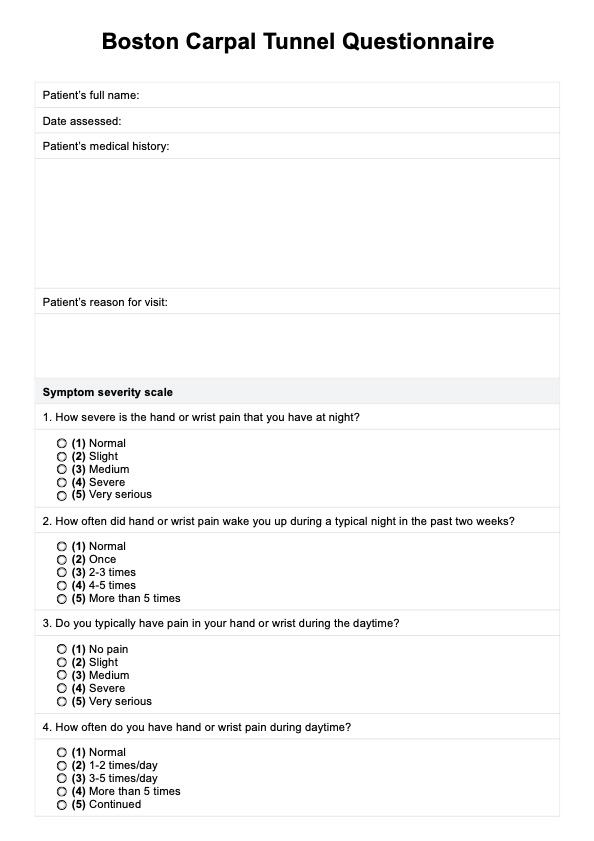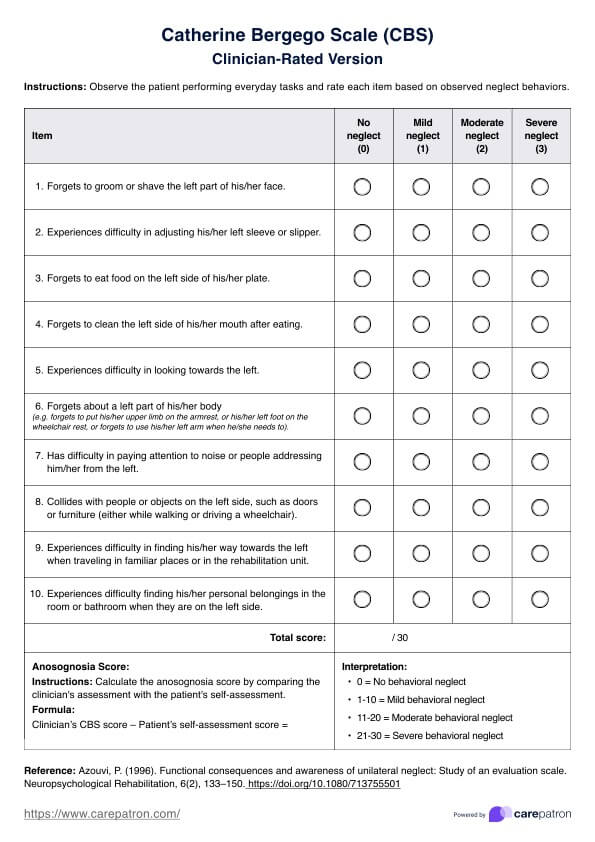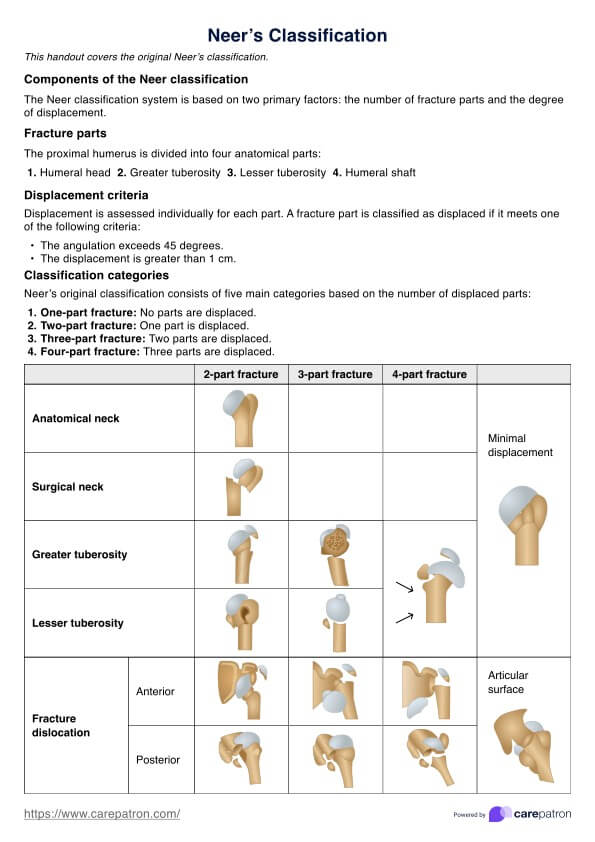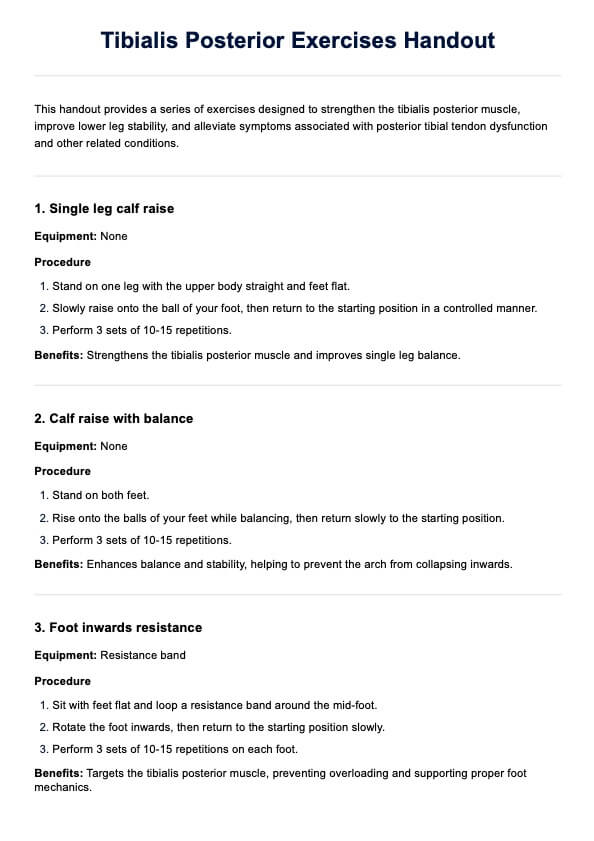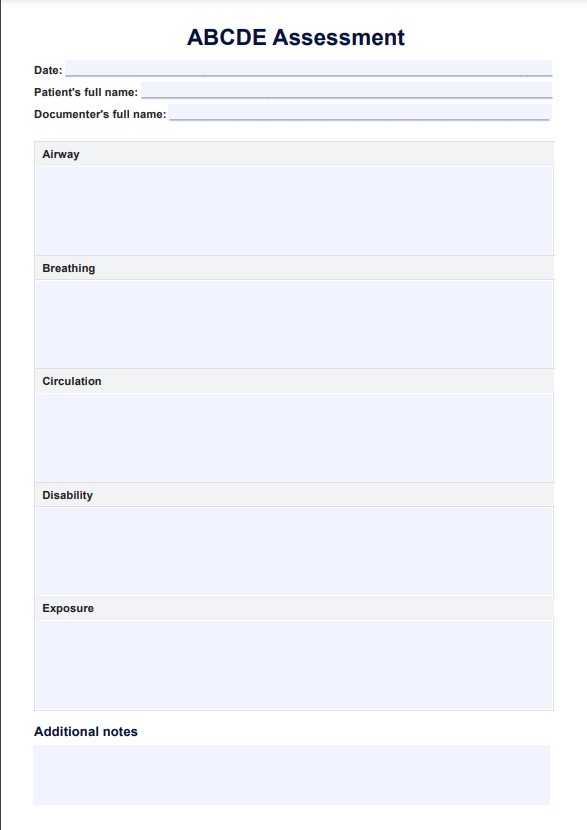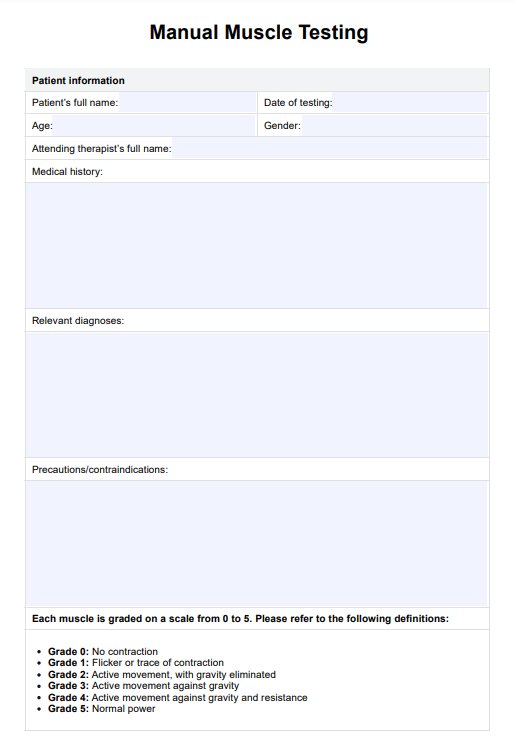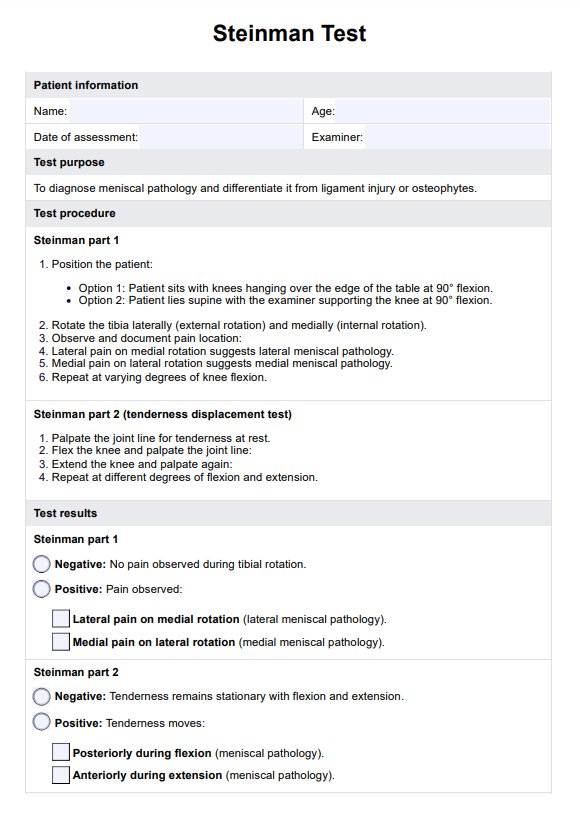MCHC Blood Test Reports
Get access to a free MCHC Blood Test Report template. Create reports for MCHC blood testing and monitor hemoglobin concentration and related conditions.


What is an MCHC blood test?
Mean corpuscular hemoglobin concentration (MCHC) is one of the key red blood cell indices in a complete blood count (CBC). Along with mean corpuscular volume (MCV) for cell size and mean corpuscular hemoglobin (MCH) for hemoglobin content, MCHC helps identify the underlying causes of anemia.
An MCHC blood test measures the blood's mean corpuscular hemoglobin concentration This test is primarily employed to diagnose conditions related to hemoglobin levels and assess various blood disorders. MCHC is a measure of the concentration of hemoglobin in a given volume of red blood cells. It's a calculated value derived from the measurement by dividing the hemoglobin by the hematocrit.
During an MCHC test, a small blood sample is taken from a vein in the arm and sent to the laboratory for analysis. Since the test is usually performed as part of a CBC, it includes other vital parameters like white blood cells, platelets, and red blood cells.
The blood test results are then recorded in an MCHC Blood Test Report, which helps doctors and healthcare professionals understand the patient's overall health. The report usually includes the MCHC value in g/dL, along with any abnormal values and their significance.
MCHC Blood Test Reports Template
MCHC Blood Test Reports Example
How does our MCHC Blood Test Report template work?
Carepatron's free MCHC Blood Test Report template helps you document and organize all relevant information related to MCHC blood testing in a single file. Here's how to use the template:
Step 1: Access the report
Download the printable MCHC Blood Test Report PDF template using the link on this page. You can customize it in the Carepatron app or our resources library when you click "Use Template."
Step 2: Complete the patient and test details
Enter the patient’s information, including their name, age, and contact details. Next, document the test information, such as the sample type, collection date, and MCHC results. Use your laboratory’s reference range to interpret whether the levels are within normal limits.
Step 3: Add clinical interpretation and finalize the report
Based on the MCHC results, provide a brief clinical interpretation, suggesting further tests or treatments if necessary. If there are any additional notes or recommendations, include them in the designated section.
Step 4: Store for future reference
Keep a copy of the completed report in the patient’s medical records for future reference. Proper documentation ensures continuity of care and helps track any changes. Use secure digital storage or a physical filing system following your healthcare facility’s record-keeping policies.
When would you use this template?
The MCHC Blood Test Report template is helpful for monitoring and diagnosing conditions related to hemoglobin concentration in the blood. You can also use this report template to:
When assessing treatment effectiveness
Our MCHC Blood Test Report can help you track the effectiveness of treatment for blood disorders, such as anemia or sickle cell disease. By recording regular MCHC measurements, you can monitor changes in the patient's hemoglobin levels and adjust treatment plans accordingly.
When identifying potential health issues
Abnormal MCHC measurements may indicate underlying health issues like iron deficiency anemia or thalassemia. With this, you can document and track these measurements, allowing for early detection and prompt treatment of potential health issues.
When collaborating with other healthcare providers
By keeping a record of MCHC measurements in an easily accessible format, you can readily share the information with other healthcare providers involved in the patient's care. This can facilitate collaborative decision-making and improve the overall quality of care for the patient.
When educating patients
The MCHC Blood Test Report template is also helpful in educating patients about their blood health. Patients can become more involved in their healthcare and make informed decisions by explaining the significance of MCHC measurements and how they relate to their overall well-being.
What do the results mean?
The MCHC blood test measures the concentration of hemoglobin in the blood. The results are represented as a numeric value. Here's what the results may indicate:
- Normal range: A normal MCHC range is between 32 and 36 grams per deciliter (g/dL) or 34% Hb/cell (Brihi & Pathak, 2024; University of California San Francisco Health, 2024).
- Low levels: A lower-than-normal MCHC value may indicate anemia, with insufficient healthy red blood cells to carry oxygen throughout the body. Other potential causes of low MCHC levels include iron deficiency.
- High levels: A high MCHC can suggest hemolytic anemia, where red blood cells break down too quickly, or hereditary spherocytosis, a genetic condition linked to anemia and gallstones. Proper diagnosis requires additional testing to confirm the underlying cause.
It is important to note that these results should not be interpreted in isolation and should always be evaluated alongside other blood tests and medical history.
Benefits of using an MCHC Blood Test Report template
Using an MCHC Blood Test Report template makes recording and understanding test results easier. Here are three significant benefits of using this template:
It saves time and reduces errors
A ready-made template means you don’t have to create a report from scratch, helping you work faster. It also ensures you include all the essential details, like patient info and test results. This reduces the chance of missing something or making errors.
It keeps patient records neat and easy to find
The format makes it simple to organize and store reports. When all MCHC test reports look the same, comparing results over time is easier. This helps healthcare professionals track changes and provide better care.
It makes results clear for everyone
A well-structured report helps doctors, nurses, and patients understand the test results. It includes reference ranges and explanations, making the information easy to use. This makes it simpler to decide on the next steps for treatment or further testing.
References
Brihi, J. E., & Pathak, S. (2024, June 8). Normal and abnormal complete blood count with differential. National Library of Medicine National Center for Biotechnology Information; StatPearls Publishing. https://www.ncbi.nlm.nih.gov/books/NBK604207/
University of California San Francisco Health. (2024). RBC indices. https://www.ucsfhealth.org/medical-tests/rbc-indices
Commonly asked questions
A blood transfusion is not usually required for a low MCHC unless the condition is severe and causing significant symptoms, such as extreme anemia. Treatment typically addresses the underlying cause, like iron deficiency or chronic disease.
Anemia treatment focuses on addressing its root cause. Blood loss may require IV fluids, oxygen, and transfusions, while nutritional deficiencies are managed with iron, B12, or folate supplements. More severe cases, like aplastic anemia, may need bone marrow transplantation.
Liver disease can contribute to anemia by affecting red blood cell production, increasing blood loss, or destroying red blood cells. The severity and type of anemia depend on the underlying liver condition, such as cirrhosis or chronic hepatitis.


